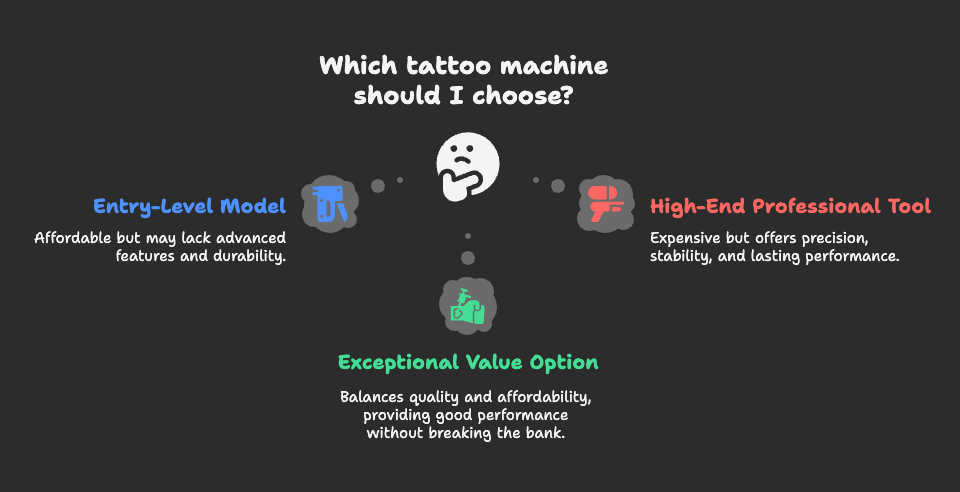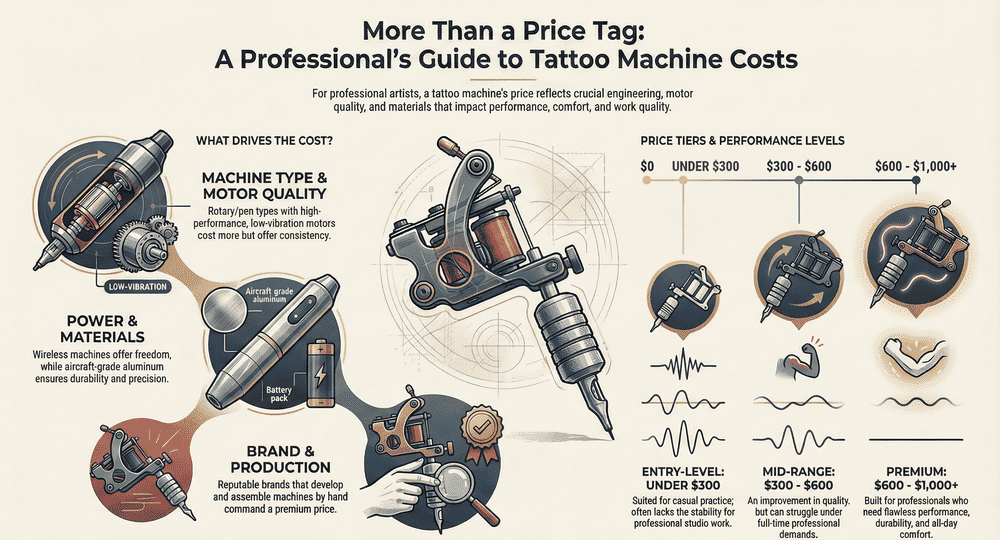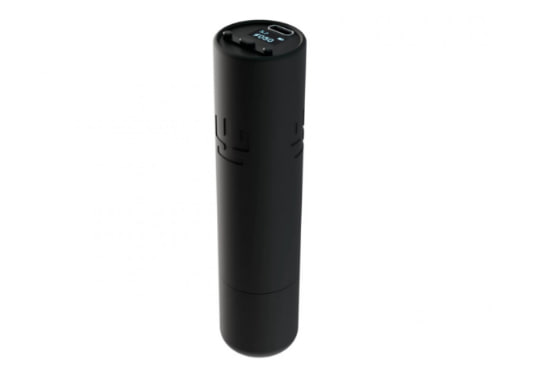How Much Does a Tattoo Machine Cost?

Tattoo machine price can range from $100 for entry-level models to well over $1,000 for high-end professional tools. But for working artists, it’s not about finding the cheapest option—it’s about choosing equipment that delivers lasting performance.
At the top of the premium range is the Ultron 4 Pro, designed for artists who demand precision, stability, and zero compromise. It’s built for consistency, no matter the session length or tattoo style.
For those looking for exceptional value without sacrificing quality, the Ultron 3 Bubble Gum offers powerful performance, ergonomic balance, and trusted durability at a more accessible price point.
Understanding the real cost of a tattoo machine means looking beyond the price tag—toward what it gives you in speed, comfort, and results.
Don't want to read? Listen to our podcast!
What Affects the Price of a Tattoo Machine?

Several key factors influence how much a tattoo machine costs. The first is machine type—rotary, coil, or tattoo pen. Rotary and pen machines typically offer smoother performance, lower noise, and require less maintenance, which increases their base cost.
Another major component is motor quality. Machines with high-performance, low-vibration motors are more expensive but deliver consistent results over long sessions. The Avenger 3 Pro Camo Grey Pink is a great example of a premium wireless tattoo machine engineered for daily studio use.
Power configuration also plays a role. Wireless tattoo machines cost more due to built-in batteries and onboard controls, offering greater freedom and mobility. Materials matter too—aircraft-grade aluminum, custom grips, and precision machining all drive up manufacturing costs.
Finally, the brand’s reputation and production standards directly impact pricing. Machines developed in-house and assembled by hand come at a premium—but they offer reliability that mass-produced devices can’t match.
Why Premium Machines Cost More
Premium tattoo machines are built for professionals who need flawless performance every time. The higher price reflects superior engineering, durability, and attention to detail—factors that directly affect how well the machine performs under pressure.
These machines are made with advanced motors, stable power delivery, and precisely machined components that reduce vibration and hand fatigue. The Avenger 2 Pro is a perfect entry point into the premium class. It combines consistent power output with a lightweight, ergonomic design, making it ideal for long hours of lining or shading.
Premium machines also last longer and require less maintenance, reducing long-term costs. For serious artists, this isn’t a luxury—it’s a necessity. Reliable tools improve your workflow, your results, and your reputation. That’s why investing in high-end equipment pays off far beyond the price tag.
Price Ranges – From Entry-Level to Pro

Tattoo machines generally fall into three price categories. Entry-level models, typically under $300, may work for short-term use or casual practice but often lack stability, precision, and durability. These machines are usually mass-produced with basic components and limited adjustability.
Mid-range machines, priced between $300 and $600, offer improved materials and motor quality, but can still struggle under full-time studio conditions. They’re a step up—but not always studio-ready.
Premium machines, starting around $600 and going well above $1,000, are made for professionals who demand top-tier performance. The Ultron 3 sits firmly in this category, offering smooth power delivery, customizable grip options, and excellent balance for all-day comfort.
Understanding these price tiers helps artists choose equipment that matches their workflow and future goals—not just their current budget.

How to Choose the Right Machine for You
Choosing the right tattoo machine depends on your experience level, tattooing style, and daily workload. Beginners might look for something versatile and user-friendly, while professionals often prioritize power, precision, and durability.
If you focus on clean linework, soft shading, or color packing, your needs will differ—and so should your machine. Think about whether you want a wired or wireless setup, how important low vibration is to you, and whether modular grip options matter in your workflow.
For artists seeking a well-rounded professional tool, the Ultron 3 Space offers a balanced blend of performance and control. It’s especially effective for artists who need one machine that can handle diverse styles.
For more guidance, check out our blog post: How to Choose a Tattoo Machine.
Is a Premium Machine Worth the Investment?
For serious tattoo artists, investing in a premium machine isn’t just about performance—it’s about confidence. High-end machines deliver smoother lines, better ink saturation, and less physical strain over long sessions. They’re built to handle daily use without slowing you down.
The Ultron 2 Premium Big Heavy Grip is a great example of a machine designed with longevity and control in mind. With its heavyweight grip and steady output, it’s made for artists who value precision and endurance.
While premium machines come at a higher cost upfront, they often pay for themselves through fewer repairs, better results, and happier clients. Want to know why top professionals always go premium? Read more in our blog post: Top Vlad Blad Tattoo Machines.
Final Thoughts
Tattoo machine price isn't just a number—it's a reflection of quality, engineering, and the kind of work you want to deliver. Whether you're just starting out or running a busy studio, investing in the right machine can elevate your craft, reduce hand fatigue, and help you create consistently excellent tattoos.
If you're ready to upgrade, explore our full line of professional tattoo machines at Vlad Blad—designed by artists, for artists who refuse to compromise.
